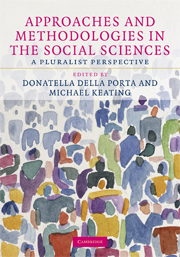Book contents
- Frontmatter
- Contents
- List of figures
- List of tables
- Contributors
- Preface
- 1 Introduction
- Part I Epistemology and philosophy of the social sciences
- Part II Research design
- 10 Concepts and concept formation
- 11 Comparative analysis: case-oriented versus variable-oriented research
- 12 Case studies and process tracing: theories and practices
- 13 Quantitative analysis
- 14 The design of social and political research
- 15 Ethnographic approaches
- 16 Comparing approaches, methodologies and methods. Some concluding remarks
- References
- Glossary
- Index
10 - Concepts and concept formation
Published online by Cambridge University Press: 05 June 2012
- Frontmatter
- Contents
- List of figures
- List of tables
- Contributors
- Preface
- 1 Introduction
- Part I Epistemology and philosophy of the social sciences
- Part II Research design
- 10 Concepts and concept formation
- 11 Comparative analysis: case-oriented versus variable-oriented research
- 12 Case studies and process tracing: theories and practices
- 13 Quantitative analysis
- 14 The design of social and political research
- 15 Ethnographic approaches
- 16 Comparing approaches, methodologies and methods. Some concluding remarks
- References
- Glossary
- Index
Summary
Most political and social science research, whether explicitly or implicitly, is comparative research. That is, most research is concerned with findings which are directly compared across countries or cases, or which can be tested against theories and inferences derived from such a comparison of countries and cases. Comparison also involves explanation, in that one of the principal reasons that we invoke comparisons is to explain how ostensibly different factors have led to similar outcomes, or how ostensibly similar situations have led to different outcomes. Why, for example, does turnout in national elections fall below 50 per cent in two countries as diverse as the United States and Switzerland (Franklin 2004)? And why has a far-right populist party, the Vlaams Belang, enjoyed substantial electoral success in the Flemish-speaking region of Belgium, while the equivalent party, the Front National, has failed miserably in the French-speaking region (Coffé 2005)?
The first, and in many ways most important lesson in developing and understanding these comparisons is to know whether like is being compared to like. Are the objects being compared – national electoral contests, far-right populist parties – similar to one another? Are they the same thing, or perhaps even functional equivalents? Or are they so different that any comparison between them is likely to prove meaningless? In England, when like cannot be compared to like, and hence when the objects involved are strikingly different, people tend to speak of chalk and cheese.
- Type
- Chapter
- Information
- Approaches and Methodologies in the Social SciencesA Pluralist Perspective, pp. 177 - 197Publisher: Cambridge University PressPrint publication year: 2008
- 28
- Cited by

